Friday 30 December 2011
The value of the 19th century novel
But then Dostoyevsky is a different kind of writer - he prefigures the existentialists and the nightmare visions of Kafka.
But the fact is that even the tamer, more conventional writing of the period is of worth and can teach a whole lot to any budding writer.
Even the equivalent chick lit of that time. I mean there's a lot of passion to Wuthering Heights - and it's genuine, heart-warming, involving even if you're a cynical male...
And that novel is one of many that's finely structured. WH may be an odd example in that is a sort of Pandora's box story-within-a-story, but the A to B novels of the day, be it in Balzac, Zola, Tolstoy or Stendhal, have merit... They are finely written, descriptive and have one aspect that lacks in today's serious fiction - it reflects their time of production.
A lot of the social realism in those novels are mirror images of the time the writers were writing in... Stendhal, however soppy a lot of his romances are, give a real vivid impression of 19th century society. The post-modernist trickery of today's fiction is more interested in the idea of meta-fictional illusion by reminding the reader that he is reading a work of fiction... Either case, neither social realism nor meta-fictitious narratives are the one-and-only way to write fiction, but both are equally valuable.
Wednesday 28 December 2011
Sensory and cognitive perceptions in music
The Double Life of Veronique (Kryzstof Kieslowski, 1991)
For a film module I'm taking I did a presentation on this clip. I touched on several themes, but something I covered that I'd like to explore in further detail here is a theme of 'universality' and its relation to music.
Double Life is a film Kieslowski made in the wake of a realisation that his storytelling gifts were universal. He realised that he didn't, he said, make small 'provincial' films but that his films moved hearts from across the globe.
The film features the same person, Veronique/Weronika, or far more arguablytwo 'soul mates', who make different ethical choices. Both are musically gifted and when Weronika has a chance to be a lead singer in a choral piece, because of her frail heart condition, collapses and dies. Veronique, having a presentiment or fear that this fate awaits her, pulls out of music.
So, using this clip, I argued that people from all walks of life react similarly to the same piece of music because it is a 'universal' language. I argued that music could be seen as more sensory than cognitive; you 'feel' it far more than 'think' through it.
In hindsight, I realise that this isn't entirely true... It's just that, because of my lack of technical musical knowledge, I see music as some sort of ineffable language that can't be explained nor elucidated...
But is music really a 'universal' language? This may seem odd coming from an ardent fan of classical composers like Xenakis and Varese and dissonant rock performers like The Fall and Captain Beefheart...
That's why many of the post-war composers were accused of 'elitism' - producing material that could only be heard and understood by small groups of people.
Kieslowksi used music to represent this interconnection between cultures, to bridge a gap between eastern and western Europe. People can be united by the 'Ode to joy', but would the blaring sounds of Varese's Ionisation really do the trick? ...
Yet, still, for me, listening to modern classical music is a sensory experience. Never setting my eye on the scores of these pieces I just listen to the sounds and try disentangling the musical activity. This still isn't cognitive - I'm not exactly using my brain to decode intellectual processes... I'm basically reacting very emotively to something that was conceived in a very methodical and intellectual manner.
And to place all this together is in itself a mathematical discipline. The school of serialism and many other forms of modern composition use procedures that are cognitive... But when I hear music by Webern and Berg I'm not able to distinguish all this - I react to it through sheer intuition.
Whilst listening to music is principally, though not always, a sensory endeavour... the argument I made in my presentation is arguable. The Third Reich appropriated Wagner in their pursuit of world domination, but did the whole world come together as a result? No.
Friday 23 December 2011
Why the political and metaphysical are intrinsic
A perceptive comment left by Doug said the following: "The metaphysical and the physical are one and the same. I do not feel this requires a dismissal of political events. I do feel that it does lend itself more to certain political leanings for a variety of different reasons."
Either way, both are unavoidable. The mind is at once controlled by politcal beauracracy and unconscious impulses. Rejecting one or the other is denial.
Political machinations are the foundation for everyone's lives. I wouldn't say that it's vital to keep a close watch on the current political events, but important decisions reached at the commons have a direct or indirect effect on other people's lives. It certainly isn't foolish to have political inclinations.
And the political has an intrinsic relationship with the metaphysical. For instance, the films of Kryzstof Kieslowski recurrently feature the theme of destiny and the synchronism of human emotion. These are metaphysical themes influenced by philosophical texts. Yet the destinies of these characters are at once determined by politcal undercurrents and their own free will.

Blind Chance
Take his film Blind Chance. The film sees Witek chasing a train, foreseeing three possible outcomes: he cathces it and works as intelligence for the communist government; he misses the train and becomes a dissdent; he crashes into a train attendant and he decides to continue his medical studies, living an apolitcal life.
It certainly was audacious to make this film under the communist regime, but that's beside the point: this film is a composite of metaphysical elements and political. Witek has existential dilemmas that he attempts to confront, which are determined by the repression of the communist order.
If one is able to gauge an idea of the metaphysical, a good and common example is the dream life of an individual. The political climate no doubt influences the outcome of a dream - especially if it's communist Poland or the Soviet Union - yet at the same time the so-called 'unconscious' of an individual has an inverse function: it determines the choices we make, the way we behave, and it moulds our society.
How does the agenda I had three years ago reflect this? How does one 'distort reality'? The distortion of reality is certainly something I continue to be interested in, but is completely irrelevant to the 'reality is fiction and fiction is reality' argument. Reality and fiction play off one another - the distortion of reality is an entirely different endeavour that would require an entirely different blog post...
Saturday 10 December 2011
Review #26
 Memorias prematuras (Premature Memories) by Rafael Gumucio
Memorias prematuras (Premature Memories) by Rafael GumucioA descendent of the political left, Gumucio found himself exiled from his own country, Chile. This, his first novel, charts his experiences abroad as a coming-to-age story of his place of birth viewed from afar.
What I think makes the whole thing effective is that it is narrated from the point of view of a child. Gumucio is not really evoking but almost transmitting his experiences, or 'recording' them, from the very instant.
The character aspires to be a 'genius' within a world lacking in culture, but his own limitations counterabalance against that, which leads to feelings of impotence and self-loathing.
And the novel's frequent shift to adulthood gives it a sense of reflexivity that sheds light on these 'premature memories'.
A very entertaining read and suitable for any kindred spirit who lives in Chile and has felt distanced by the country's disparity and class system.
-------------------------------
I copy and pasted this from my GoodReads account so that I can get all the procrastination out of my fucking system and to finally focus on my essay!
Friday 9 December 2011
Thursday 8 December 2011
Oh fuck...
Another 2,000 word essay due in for the following Friday...
Haven't started either.
Saturday 3 December 2011
My favourite films of the year
Midnight in Paris
 I saw this at a cinema in Buenos Aires, an experience which shaped a short story called '8 PM in Buenos Aires'. I was giggling and smiling throughout the entirity of this. A young Hollywood hack wants to get into serious novel writing, starting a book about someone who runs a nostalgia shop in Paris. He is a fanboy obsessed with the Parisian literati of the 1920s and, hey ho, as he walks through the Parisian streets a time warp materialises, Woody doesn't explain how, and he arrives at 1920s, meeting all his literary idols - Hemingway, F. Scot Fitzgerald, Gertude Stein among others! In my story, I walk out of the cinema and meet all my Argenitnean literary heroes! It was kind of funny that, when I saw this at the local cinema here at the university, not a student was in sight - heaving with old fogeys. For them Allen is an object of nostalgia, the very thing the film (very light-heartedly) lampoons. This has to be his best film in many, many years.
I saw this at a cinema in Buenos Aires, an experience which shaped a short story called '8 PM in Buenos Aires'. I was giggling and smiling throughout the entirity of this. A young Hollywood hack wants to get into serious novel writing, starting a book about someone who runs a nostalgia shop in Paris. He is a fanboy obsessed with the Parisian literati of the 1920s and, hey ho, as he walks through the Parisian streets a time warp materialises, Woody doesn't explain how, and he arrives at 1920s, meeting all his literary idols - Hemingway, F. Scot Fitzgerald, Gertude Stein among others! In my story, I walk out of the cinema and meet all my Argenitnean literary heroes! It was kind of funny that, when I saw this at the local cinema here at the university, not a student was in sight - heaving with old fogeys. For them Allen is an object of nostalgia, the very thing the film (very light-heartedly) lampoons. This has to be his best film in many, many years.Cave of Forgotten Dreams
 Herzog acquired special permission to go into the Chateu Cave, home to the oldest cave paintings on earth. I didn't see this in 3D (it was a free screening, so I guess I shouldn't complain...), but it was still absolutely remarkable. With his classic wry humour and poetic insight, Herzog narrates these truly astonishing and historic paintings. Ever the anthropologist, there are numerous interviews with experts which delve into the living conditions of these prehistoric men. "These are the first examples of prototype cinema," Herzog says. However bizarre its ending (Herzog latches on a 'postscript' about albino crocodiles), this is still an enthralling mesmeric experience. To think that it may have been even more extraordinary in 3D!
Herzog acquired special permission to go into the Chateu Cave, home to the oldest cave paintings on earth. I didn't see this in 3D (it was a free screening, so I guess I shouldn't complain...), but it was still absolutely remarkable. With his classic wry humour and poetic insight, Herzog narrates these truly astonishing and historic paintings. Ever the anthropologist, there are numerous interviews with experts which delve into the living conditions of these prehistoric men. "These are the first examples of prototype cinema," Herzog says. However bizarre its ending (Herzog latches on a 'postscript' about albino crocodiles), this is still an enthralling mesmeric experience. To think that it may have been even more extraordinary in 3D!The Tree of Life
 Pretentious? Check. Humourless? Check. A lot of whispering voices? Double check! Malick has been given full rein to indulge himself as much as he can, but the thing is that this is the most ambitious and complex film to hit the multiplexes since 2001. And once more, like the Herzog, I didn't see this in its full glory. A film of such grandiose proportions should really be seen at cinemas but, alas, I went to Chile whilst this was screened in the UK. And it was just about to be shown in South America just as I came back here! So I had to comfort myself with the DVD. This really reminded me of Tarkovsky Mirror, a sort of autobiographical mosaic/cine-poem... It was beautifully shot, not to mention the fascinating recreation of the genesis... The ending I found rather beautiful, however sentimental many would accuse it of being. Few worldwide multiplex films have so many early walk-outs, but then few are this beautiful. What the hell is this all about some may ask? The answer is: everything starting from time immemorial!
Pretentious? Check. Humourless? Check. A lot of whispering voices? Double check! Malick has been given full rein to indulge himself as much as he can, but the thing is that this is the most ambitious and complex film to hit the multiplexes since 2001. And once more, like the Herzog, I didn't see this in its full glory. A film of such grandiose proportions should really be seen at cinemas but, alas, I went to Chile whilst this was screened in the UK. And it was just about to be shown in South America just as I came back here! So I had to comfort myself with the DVD. This really reminded me of Tarkovsky Mirror, a sort of autobiographical mosaic/cine-poem... It was beautifully shot, not to mention the fascinating recreation of the genesis... The ending I found rather beautiful, however sentimental many would accuse it of being. Few worldwide multiplex films have so many early walk-outs, but then few are this beautiful. What the hell is this all about some may ask? The answer is: everything starting from time immemorial!
Friday 18 November 2011
You have fifteen seconds to summarise Proust!
So for this blog's video fix, time for something completely different.
Summarise Proust Competition by Monty Python
Saturday 5 November 2011
Film adaptations I'd like to make
The atmosphere of this book... is so visual and haunting. To visually recreate the scenes of this book with quality cinematography and set designs would be the bomb... The footage shot outdoors with an abundance of snow and whiteness in contrast with the darkness and murkiness of interior shots would be remarkable. Would the screenplay writer add an ending or leave it at a loose end?
THE SOUND AND THE FURY, WILLIAM FAULKNER
I think this has already been made, but from what I can gather that adaptation is a linear recreation of the book. But wouldn't it be cool to attempt a literal adaptation of this? True, it would be almost impossible, but the frenetic jumps in time would be interesting to see on the screen. It would be intriguing to see how a film-maker would try to create a cinematic equivalent of Quentin's mental collapse. With the increasing number of hollywood non-linear flicks I see no reason why someone can't take the bull by the horns and attempt to transpose this into visual form.
THE OBSCENE BIRD OF NIGHT, JOSE DONOSO
Many would argue that the sheer complexity of this novel + the number of perspectives, dual narratives would not tranfer well to the screen. Apparently Luis Bunuel kept telling Donoso that he wanted to film this, but that the narrative strand of the deformed mutants didn't interest him. He wanted to exclusively recreate the old ladies' home. Personally I'd rather see an attempt to construct expensive set designs of the castle Azcoita builds for his son 'Boy' + gory make-up and costumes done for the mutants.
HOUSE TAKEN OVER, JULIO CORTAZAR
Well, I've already written a screenplay for a short film of this, so it'd be nifty to see someone film it.
THE DROWNED WORLD, J.G BALLARD
Ballard is a very visual writer, so he really makes you feel this vision of an inundated London... The thrilling storyline would fare well in a film too.
Wednesday 2 November 2011
Reading list for pleasure
Elecciones presidenciales, democracia y partidos politicos en el Chile pos-Pinochet - Alan Angell (Non-fiction, politics)
Habana para un infante difunto - Guillermo Cabrera Infante (Fiction)
The Rest is Noise - Alex Ross (Non-fiction, music)
The Book of Illusions - Paul Auster (Fiction)
A Cultural History of Latin-America: Literature, Music and Visual Arts in the 19th and 20th Centuries - Leslie Bethell (Non-fiction, culture)
Hijos sin hijos - Enrique Vila-Matas (Fiction)
El astillero - Juan Carlos Onetti (Fiction)
Blood Meridian - Cormac McCarthy (Fiction)
Thus Spoke Zarathustra - Friedrich Nieztsche (Non-fiction, philosophy)
A book on German culture.
Cloud Atlas - David Mitchell (Fiction)
Existentialism is Humanism - Jean-Paul Sartre (Non-fiction, philosophy)
Los lanzallamas - Roberto Arlt (Fiction)
Los siete locos - Roberto Arlt (Fiction)
History of Western Philosophy - Bertrand Russel (Non-fiction, philosophy)
I want to broaden my horizons, so about 45% of this is non-fiction.
But... I plan to read all this... in about three years' time, after I've completed university. I'm so anxious to get my hands on these books that dropping out altogether may be on the cards for the rest of my tenure here!
If I manage to organise my time and actually get around to studying (instead of worrying about studying) I may get around to reading all this... but that I ain't gonna happen... Besides, I don't want to be distracted by my studies when dipping into these beasts.
Friday 21 October 2011
A list of people I despise
I'll try to think of more later.
THEY'RE ALL CUNTS OUT THERE!!!!!!!!
Sunday 16 October 2011
Sunday 9 October 2011
Top 11 Films - Revised
1. 2001: A Space Odyssey (1968, Stanley Kubrick) USA
2. Blue Velvet (1986, David Lynch) USA
3. Andrei Rublev (1966, Andrei Tarkovsky) RUSSIA
4. A Man Escaped (1956, Robert Bresson) FRANCE
5. Aguirre, the Wrath of God (1971, Werner Herzog) GERMANY
6. The Second Heimat (1992, Edgar Reitz) GERMANY
7. The Big Lebowski (1998, Coen Brothers) USA
8. The Producers (1968, Mel Brooks) USA
9. Taxi Driver (1977, Martin Scorcese) USA
10. The Passion Joan of Arc (1928, Carl Theodor Dreyer) DENMARK/FRANCE
11. Three Colours Trilogy (1993-94, Kryzstof Kieslowski) POLAND/FRANCE
Honourable mentions: Crimes and Misdemeanors, Barton Fink, Dr. Strangelove, Stalker, Mirror La grand illusion, Ordet, Videodrome, A Short Film about Killing, The King of Comedy, The Seventh Seal, Alphaville, Vivre Sa Vie, The Green Ray, Metropolis, Spellbound, Bicycle Thieves, Burden of Dreams, The White Ribbon. ETC.
Fuck, I'm procrastinating again. I'm so easily distracted...
Friday 7 October 2011
Influences
Below I list two influences on four stories. I couldn't find any parallels for three stories (Painting on the Wall, S. B. S.B + Parasite), so these aren't listed.
False Beauty
The Savage Detectives by Roberto Bolano (Chile, novel, 1998)
The Outsider by Alber Camus (France, novel, 1942)
Deep Down in Talca
The Feast of the Goat by Mario Vargas Llosa (Peru, novel, 2000)
Pulp Fiction by Quentin Tarantino (USA, film, 1994)
The Perpetual Death of the Composer
Doctor Faustus by Thomas Mann (Germany, novel, 1947)
The Locked Room by Paul Auster (USA, novella, 1987)
Planet Zhelanie
Stalker by Andrei Tarkovsky (Russia, film, 1977)
The Circular Ruins by Jorge Luis Borges (Argentina, short story, 1941)
Friday 30 September 2011
Small turns big
It seems to me that most complex concepts - in philosophy, science, etc. - start with very simple epiphanies.
There's the classic Isaac Newton example. I can't claim to understand, nor read, any of his writings, but his big idea started small: an apple fell on his head, thus the concept of gravity came about. Eureka.
And for a lot of complicated philosophical ideas to be expounded, they are often required to be presented with a simple starting point. John Stuart Mill's utilitarianism, for instance, though a complex branch of philosophy starts with a premise that a Mozart symphony requires greater levels of intelligence and knowledge than eating an ice-cream... which leads to several discussions, theories, elaborations etc. etc. etc.
This may seem v. self-evident or simply platitudinous (my very use of this word may seem like a platitude in itself)... It's merely a (small) thought that has amused my mind recently.
------------
EDIT - When writng this I was not aware of any (possible) sexual connotations in the title of this post.
Wednesday 28 September 2011
34th Parallel
Well, I can't say it's The New York Times - but it's something. I'm going public...
My name is on the cover of some magazine, but here I am, all alone, unable to discuss it with anyone. The Perpetual Depression of Simon King.
Buy a copy to support this excellent magazine. It's part of a dying breed of publications.
Saturday 24 September 2011
The south
A Mapuche ritual in Lautaro's 'plaza'.
Cañete
A Mapuche 'ruca' presented by none other than me. In Spanish.
Too heavy to upload here. So it's on YT.
Thursday 22 September 2011
Chile
This was an almost epiphanic trip for me in that several 'positive' things occurred. I did far more socialising than usual, a dislikeable headteacher from my school in Chile was fired, a short story of mine was accepted for publication and my place in university was confirmed.
I am writing from there this very moment. I feel rather disillusioned by it - both academically and socially - but that's something I'll cover in a future post.
Sadly I didn't take as many photos as I would have liked, but I've uploaded more than enough here.
Santiago
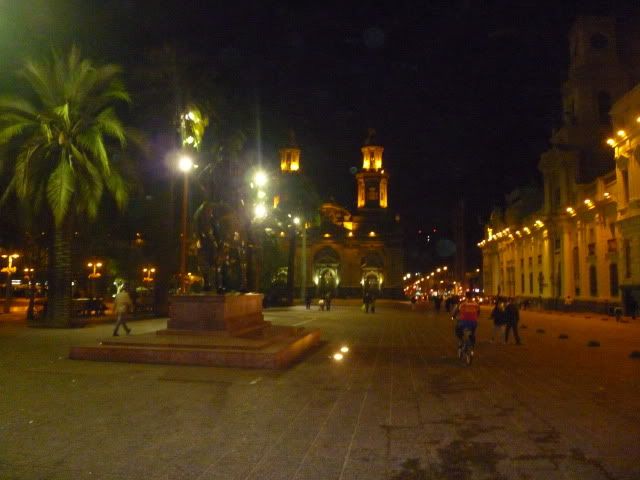
 La Moneda, at night.
La Moneda, at night.Santiago, the capital, was my base. I stood at quite a disadvantage in that I stayed at my aunt's home in quite possibly the 'poshest', most privileged area in Chile - 'La Dehessa,' which is very far apart from the city centre and tourist attractions. This meant that I had often to commute on metro to reach places of interest.
The first few days were quite boring, but I soon started keeping myself occupied.
The tentative of the trip was to really 'see' Chile, though while I stayed in Santiago I can't really say I saw 'the real Chile'. La Dehessa is a very insular place, almost antithetical to 'real' Chilean places and people. My family were very very hospitable and friendly, though
Though I did get to see more of that when going over to the Southern town I grew up in as a child, Concepción.
Concepción
The two and a half weeks I spent in Concepción were terrific. The greatest joy was having conversations with the woman of the house, Paulina. I also got on very well with their elder sons and had lots of laughs.
In terms of football, there were nuggets of gold and there were catastrophic let-downs. I went to see the team I support, Fernandez Vial, win 3-0. On the other end of the spectrum Chile, despite playing attractive football, were eliminated in the quarter-finals of the Copa America. And the luckiest national side in the world went on to win it, again with a very favourable draw - Uruguay.
While I was there I was enthralled in the fiery politics in the country, which I'll write about below.
Student Protests
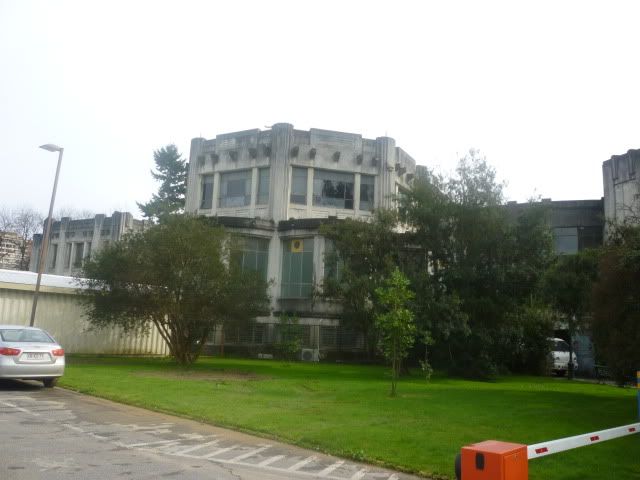
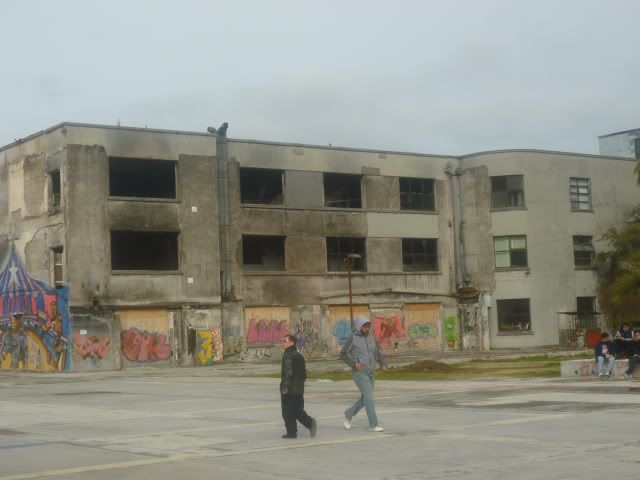
Universidad de Concepcion, gaining an almost apocalyptic dimension whilst 'en toma'.

'Lemas'.
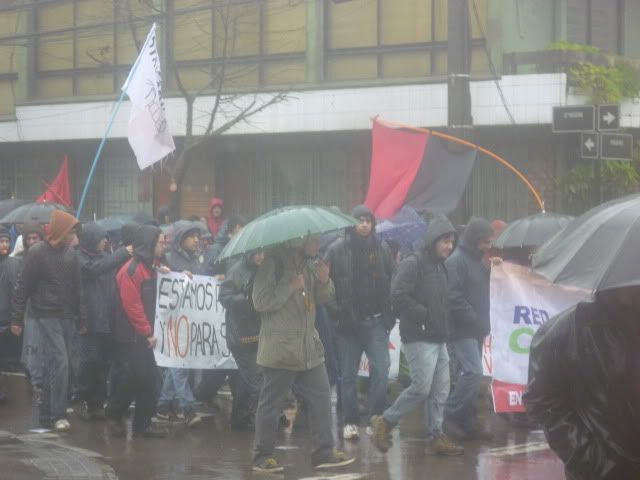
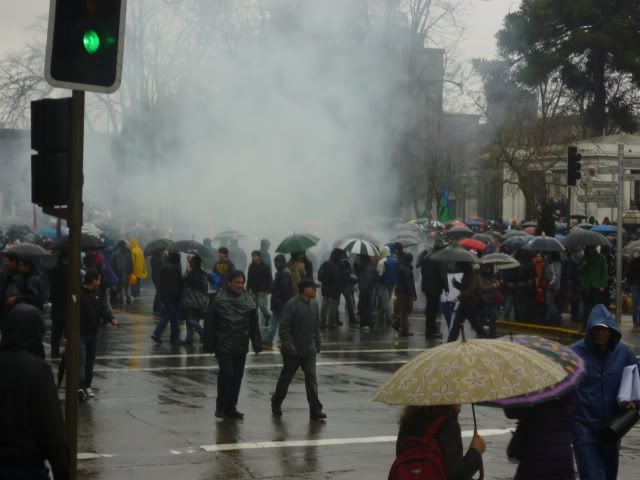 An authorised protest soon to turn into something a little nastier.
An authorised protest soon to turn into something a little nastier.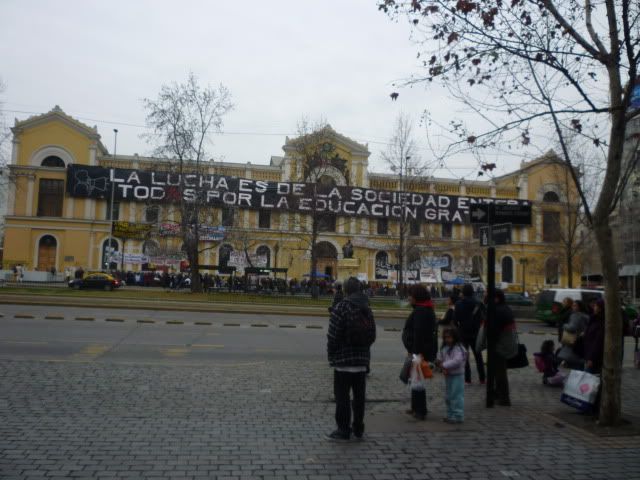 Universidad de Chile.
Universidad de Chile.What gave my trip an interesting 'backdrop' was the political situation. Indeed, I came back with a stronger political conscience.
The protests made complete sense to me. What the students are claiming for may be disproportionate, but the general sentiment is absolutely justifiably.
Basically, everything in Chile is determined by the class system. State education is of far lower quality than private, which all in all leads you to a lower qualification. Private universities, which require large sums of money, have lower requisites. In short: if you are privileged, you'll have it far easier.
Solve the problem of education, something the centre-left party didn't do for twenty years of power, and there you improve the class differences in the country.
From conversations I had with people I couldn't help but feel that 20% of Chile have a worm's eye view of the world. They lead insular lives, mingle with no other people and continue to espouse backward beliefs. "If they push themselves, they [lower-class people] can achieve," was one account. How can they achieve if the current always runs against them?
Southern Towns
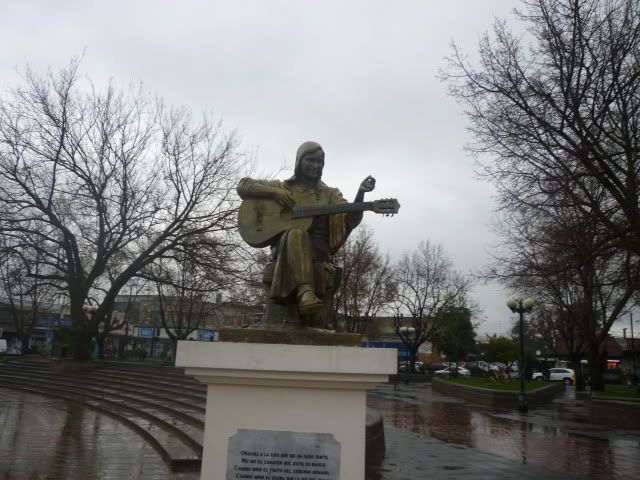 A statue of folk singer Violeta Parra in the town of her birth, San Carlos.
A statue of folk singer Violeta Parra in the town of her birth, San Carlos.
An indigenous ritual performed in Lautaro's public park. Video of this soon to follow.
 Nacimiento, one of the poorest towns in Chile.
Nacimiento, one of the poorest towns in Chile.With a childhood friend I went across about eight southern towns. Miserable weather, several 'plazas', 'Mapuches - this was quintessentially Chilean.
I was lucky enough to witness a mapuche ritual right middle in the park of Lautaro. I'll upload this as a video soon.
San Pedro de Atacama



Valle de la luna.
 Valle de marte.
Valle de marte.


Gheisers.

 This was an incredible, if tiring, experience. I went to all the attractions of San Pedro within two or three days, virtually without having slept at all. Atacama is the driest desert in the world and the altiplano, as demonstrated in these photos, is beautiful.
This was an incredible, if tiring, experience. I went to all the attractions of San Pedro within two or three days, virtually without having slept at all. Atacama is the driest desert in the world and the altiplano, as demonstrated in these photos, is beautiful.Valparaíso
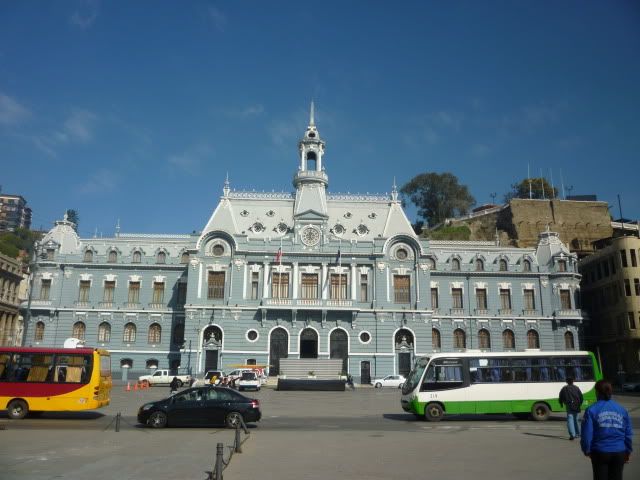

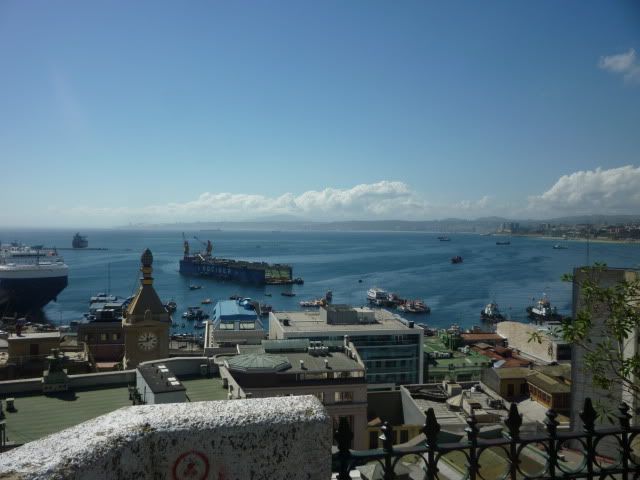 Valparaíso is a city by the port with a distinctive history. It is wonderful to climb up the hills and look at the scenery...
Valparaíso is a city by the port with a distinctive history. It is wonderful to climb up the hills and look at the scenery...This was a great, great day. I was kept good company by a friend, who I relentlessly jabbered at throughout the entire trip. Couldn't have gone on a better day.
Buenos Aires, Argentina
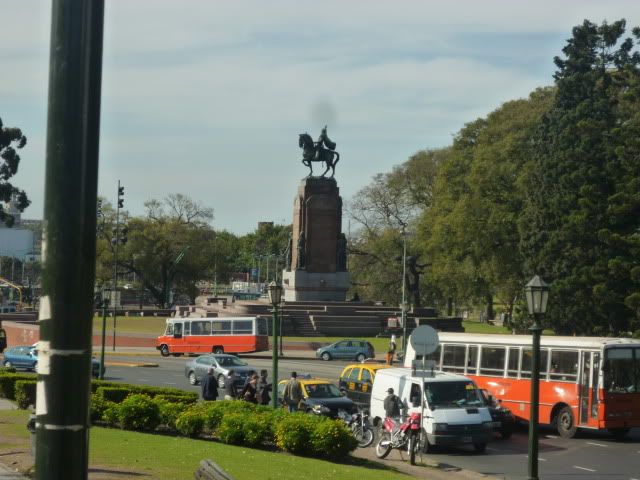
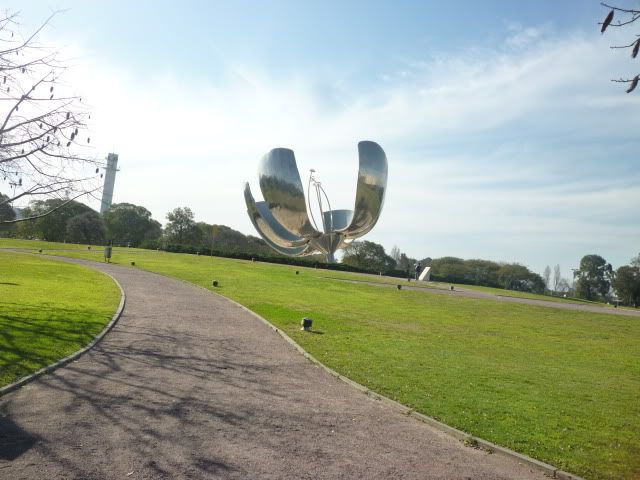
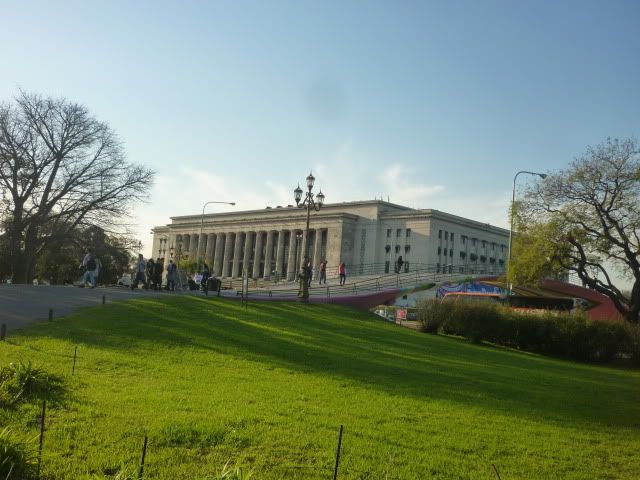
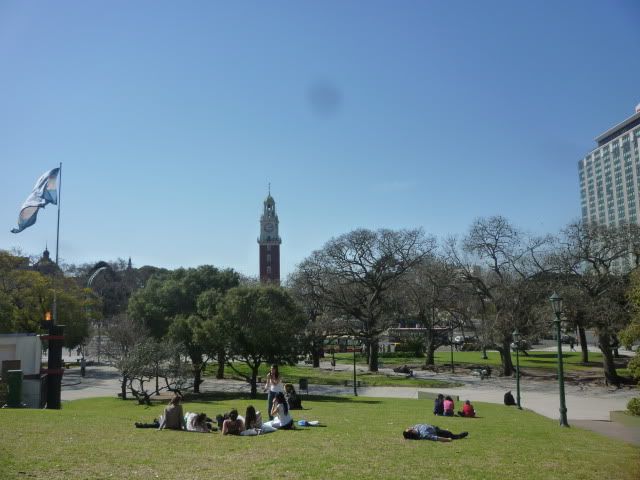

The icing on the cake. Astonishing parks, books on all corners and plenty of culture...
Friday 12 August 2011
It can happen anywhere
During my stay thus far in Chile, the social inequalities here are been protested by students claiming for fairer education system, something that, if amended, would be a stepping stone to solving the staggering class differences.
The right-wing government (the first since the dissolution of the Pinochet regime in 1990) are unable to handle the protesters, slipping down to an all-time low 26% approbation. An incompetent government, constantly changing tack and direction without a fixed plan, the social injustices have exploded all over Sebastián Piñera's face. In short, there's turmoil here - but in a 'third world' country.
Can delinquency, social unrest, carnage only erupt in third world countries? These two news bulletins to me completely refute this: social unrest can surface in any part of the world. If anything, it is very like to surface in tranquil areas.
The case in Norway is staggering, a terrorist act carried out by a single man, killing over eighty people in a country where nothing happens. I know nothing of sociology, but my gut instinct says that when a country is fully-developed and anesthetised, this can unleash many repressed feelings and... wreak havoc.
A few weeks later these brutal riots surface in England... A group of youths, perhaps bored with the mundanity of their every day lives, injected a dose of violence into this calm little island. Apparently there was no political motive, it was merely an anxious need for brutality in a world lacking it.
Tuesday 9 August 2011
My Good Reads account
Friday 5 August 2011
Thoughts on religion, existentialism and the supernatural
Tuesday 5 July 2011
New blog
Unable to work on my book of stories, I have felt very fidgety and uneasy... That's why, before I set off to the North of Chile, I have started a new project called 'On the Fly', consisting of improvised little miniatures. I think I'll be writing daily for it over the course of this week.
http://doneonthefly.blogspot.com/
Tuesday 28 June 2011
Saimon se fue p'al norte...
Sunday 26 June 2011
Confronting Reality
Confronting Reality: Stories from a Sabbatical Year is a collection of seven stories I hope to put together. I have edited the first three; the rest will be completed after my Chile odyssey.
Meanwhile there's this... An audio recording of my going through each story, describing its ethos, its incidents and messages. It's 35 minutes long; I don't understand how anyone would be willing to sit through its entirety.
I split it into two parts because it was too heavy to upload as one video... The background image was originally going to be this arbitrarily chosen one, but it made the video heavier for some reason. I had to simply slap on my profile image in the end... Not that it makes any difference.
Something I was going to mention at the end of this recording, but forgot, is that I'm like that "Shakespeare actor who always plays himself." Even though I try to write broadly, about a number of subjects, it always seems the same and somewhat monotonous... This could be remedied by attending Creative Writing classes, but I'm quite stubborn about that sort of stuff... Alas.
Friday 24 June 2011
Review #25

Kieslowski films depict characters struggling in their daily life with cultural myths. Strongly evident in this trilogy, each protagonist experiences some sort of strife with the moral codes of their community; they ultimately learn to acclimatise themselves to their conflict and find strategies of solving their issues.
Blue is a film that centres itself around emotional, not political, liberty. Julie, played by the beautiful Juliette Binoche, is wife of a renowned composer. The film begins with a car crash where she is the sole survivor, surviving her husband and five-year-old daughter. She thereafter cuts herself off from the rest of the world.
The film follows her through her isolation, discovering that her husband had been unfaithful. What fortifies the film is the perennial presence of music: whenever the protagonist closes her eyes to think, there is a fadeout superimposed with lush orchestral music.
Kieslowski said that cinema is inferior to literature because of its incapacity at showing 'the inner life,' but he does find ways of ameliorating this by depicting characters' inner thoughts. Curtailing the explicitly of cinema, he nuances the level of obviousness often prevalent in film. Everything in Blue is centred around the character, so all her surroundings become detached. Kieslowski makes every common triviality - a cup of coffee, a television set, backgrounds - lose importance as she continues to banish the world around her.
The Binoche character eventually comes around to integrating herself into the world again, completing an unfinished symphony of her deceased husband and beginning a relationship with a contact. Her emotional liberty is reciprocated and resumes her activity again.
White is considered the weak link in the trilogy, but if you consider it in its own terms it is an excellent piece of film-making. It follows the misfortunes of a Pole stranded in Paris, who is abandoned by his adored wive, leaving his him as a vagabond. After a whole series of events he becomes a rich entrepreneur after having connivingly acquired an expensive spot of land.
At the time of the film's release there was a sudden explosion in suspicious dealings and investments. For instance, people like Chealsea football club owner Abrahamovich amassed a great fortune because they managed to acquire enterprises cheaply after the dissolution of the communist hierarchy. Kieslowski was clearly unsettled by this and felt the need to comment on it.
Red no doubt features the most benevolent protagonist, played by the beautiful (how many French beauties are there?) Irene Jacob. A student who does modelling for spare cash, she runs over a dog, feels guilty and returns it to its owner. Having sought him, she finds that he is rude and cold to her. This solitary man lives isolated in a small house while monitoring tapped conversations of his neighbours.
This man turns out to have been a former judge, who now seems to be displaced with the world. With the assistance of this kind model, they establish a friendship and he turns himself into the authorities.
A concurrent narrative is of a law student's fraught love relationship. Like in Double Life of Veronique Kieslowski revels in mirroring interconnected lives. This young law student is perhaps a missing link between each other's destinies; that perhaps, had they been born in the same time-frame, they may have had a relationship.
All the films are riddled with symbolism. One recurring theme in each of the film is of an old woman scavenging over to a waste disposal to trash a bottle. In the first two films the characters simply see it from a distance; in Red, as an act of solidarity and fraternity, Jacob helps the elderly woman.
Finally: I am not one to praise, nor even notice, the cinematography of a film, but here it is unavoidable. Each film is tinted with its respective colour, in addition to being accompanied by setting and props of it. Not many directors can be acclaimed for taking content and cinematography in consideration simultaneously, not separately, but Kieslowski is one of them.
An extraordinary trilogy and definitely the most impressive piece of contemporary film-making I have encountered. Strongly recommended.
Thursday 23 June 2011
Wednesday films 2010/11
I'm going to Chile next Wednesday, so this ritual has no come to an end. I hope to practice it during my stay at university, too.
Most of the films I enjoyed enormously. The two Fellini and Godard films were excruciatingly tedious, though. I also saw many films in addition to these throughout the year. I hope to see the last film on this list, Enfant du paradis, soon.
--------------------
Jackie Brown (Quentin Tarantino)
Crimes and Misdemeanours (Woody Allen)
Deconstructing Harry (Woody Allen)
October (Sergei Eisenstein)
Intolerance (D. W. Griffith)
M (Fritz Lang)
Nosferatu (F. W. Murnau)
Ordet (Carl Theodor Dreyer)
Sunrise (F. W. Murnau)
The Cabinet of Doctor Caligari (Robert Wiene)
8 ½ (Federico Fellini)
La Dolce Vita (Federico Fellini)
Vertigo (Alfred Hitchcock)
Spellbound (Alfred Hitchcock)
Marnie (Alfred Hitchcock)
North by Northwest (Alfred Hitchcock)
The Third Man (Carol Reed)
Jules et Jim (Francois Truffaut)
Masculin Femenin (Jean-Luc Godard)
Wild Strawberries (Ingmar Bergman)
Persona (Ingmar Bergman)
Broadway Danny Rose (Woody Allen)
Hannah and her Sisters (Woody Allen)
Stardust Memories (Woody Allen)
Le Regle de Jeu (Jean Renoir)
Rebel Without a Cause (Nicholas Ray)
Three Colours: Blue (Kryzstof Kiesloswi)
Three Colours: White (Kryzstof Kieslowski)
Three Colours: Red (Kryzstof Kieslowski)
Gertud (Carl Theodor Dreyer)
Sanjuro (Akira Kurosawa)
Tokyo Story (Yasujiro Ozu)
Hidden (Michael Haneke)
Enfants du Paradis (Marcel Carne)
Monday 20 June 2011
Review #24
After the fiasco of his two Mercury albums - Unconditionally Guaranteed and Bluejeans and Moonbeams, both released in 1974 - Beefheart was a lost cause. In vain he released two self-conscious bids at commercial success, but it fired back: not only did these pithy albums sky-rocket in the charts, it also alienated his own fan-base. It was a fan-base that had grown to appreciate him for all the eccentricities that that made him so special.
A stint in Zappa's band followed, until the bearded musical polymath agreed to fund his next album. This album, sadly, has yet to see the light of day.
Beefheart's contractual situation was always wrangled - conflicting papers from different record companies claimed his ownership. Most decisively, Zappa sued his own manager and, in that complicated legal process, prevented the release of the album.
This is a huge shame. If the album had seen the light of day it would have announced Beefheart's comeback with aplomb. Beefheart, throughout the seventies, had been making compromises. Due to the obtuseness of his music, it was always clear that it could never reach wide audiences. Failure after failure followed until Van Vliet realised that all he needed to do was do what he did - and do it well.
The only way to hear the album is through bootlegs, meaning that the mixing is not as it should be and that the sound isn't crystal clear. There are good copies available, though: the one I stumbled across in Soulseek is fine.
Shiny Beast (Bat Chain Puller) is wrongly regarded as a re-recording of this album. Only five of this album's tracks appear on it, and anyone has taken the time to seek out a copy of the original BCP will realise that it is a different kettle of fish altogether. Ten of the twelve album tracks would be re-worked in his three subsequent releases: Shiny Beast, Doc at the Radar Station and Ice Cream for Crow.
The music in the album returns to the unbridled wildness of his earlier days, though it still has a little more cohesion. It is far less frenetic than the controlled mayhem in Trout Mask: the guitars sound angular and the complex signature drumming is there, but it doesn't rocket ahead so fast rapidly and anxiously. The drumming in Trout Mask, though it may not seem so at first, was centred around the other instruments. This is also the case here: the scraps of music are held together by the arhythmical drumming, though it is more paced and relaxed.
The opener 'Bat Chain Puller' was centred around a drum rhythm: the windshield wipers in Don's car. And the rhythm sounds just like that. Drabber than the version on 'Shiny Beast', it is a funky and foot-tapping in a strange Beefheart sort of way (my dad once put this on thinking that he had an African music cd on the player and he started dancing to it - which he never does - completely unaware that it was Beefheart!).
The lyrics are back to free-association and weirdness. While Beefheart's voice by this point was gravelly and cracked, he couldn't really sing as he used to, but he delivers it methodically and humorously. "Bat Chain" he deadpans. "Bat Chain Puller," he continues, before vociferating "BAAAAAAAAAAT CHAAAAAAAAIN PULLER." Again he draws from rural and wildlife imagery, the subject of his expressionist oil paintings, to flesh out these non-sensical - though hilariously entertaining - lyrics.
'Seam Cooked Sam' is a song with very complex guitar lines, which coalesce and intertwine atonally. Beefheart 'reads out' a surreal poem. This intriguing oddity never resurfaced in any of the later re-recordings.
'Harry Irene' is far superior to the Shiny Beast version. It's mainly the timbre of the keyboards that make this one special, ironically sounding like a lounge combo. The good thing like a track like this is its levity: something good to be placed amongst an abundance of complexity and difficulty.
There is a return to 'spoken word' tracks on this album. Two are featured on the album. 'Poop Hatch' is a little repetitive, not helped by Beefheart's tired delivery that a critic remarked sounded as if he were reading from an extensive shopping list. The closing track 'Apes-Ma' is full of his characteristic humour, clocking in at 40 seconds. "Your cage isn't getting any bigger, Apes-Ma."
And then there's two instrumentals. 'Flavour Bud Living', here played by the drummer and musical arranger John French, is substantially different on this version. It is played far more quietly and contemplatively, in contrast to the more accelerated and Oriental-tinged version rendered by Gary Lucas on Doc. The lovely guitar and piano duet 'A Carrot is as Close as a Rabbit Gets to a Diamond', a very melodic and cohesive piece, is exactly like the version that appeared on Doc.
The 'Brickbats' version that appeared on Doc is much better because here the cacophonous sax is mixed far too loud, obscuring all the stimulating musical activity. Every time I put BCP on and this comes on, I root for the skip button.
There are two rollicking blues-rock tracks which, by Beefheart standards, are fairly orthodox... yet still far from normal. 'Floppy Boot Stomp' and 'Carson City' they are played with more vigour and bite than in the Shiny Beast versions, though Beefheart's delivery on the BCP tracks are below par.
By far, the album's highlights are the tracks 'Odd Jobs' and 'The Thousandth and Tenth Day of the Human Totem Pole'. They sound like what would have happened if Stravinsky had been persuaded to write a rock song. Both clocking in at over five minutes, which for Beefheart is long, they are meticulously crafted and superbly rendered. The lyrics are memorable as well, the former track describing the absence of a charismatic tramp and the latter a tongue-in-cheek Beefhearterian allegory. These two songs are the best tracks from Beefheart's late period material.
The Zappa family trust own the rights to the tapes, yet they continue to abstain from its release... Hopefully if more laudatory reviews and write-ups like this appear on the internet they may get their finger out... Release the fucker!
Friday 10 June 2011
Routines
Wednesday 8 June 2011
21






Sunday 5 June 2011
Unregistered comments enabled
Can't say this will boost the meagre amount of comments I receive... A very vain decision indeed.
Friday 3 June 2011
Antonio Di Benedetto
Audio of my effusive recommendatory praise for the Argentinean writer Antonio Di Benedetto.
I make quite a few slips and grammatical mistakes during the recording. For instance I say 'economic' instead of 'economical' and there's quite a lot of verbal repetition. It's oral language, not written, so there are bound to be some inconsistencies.
Hear my voice in all its glory.
Sunday 29 May 2011
Review #23


